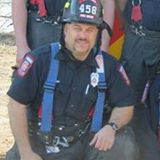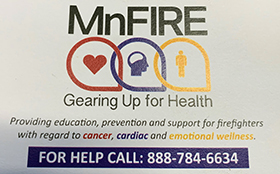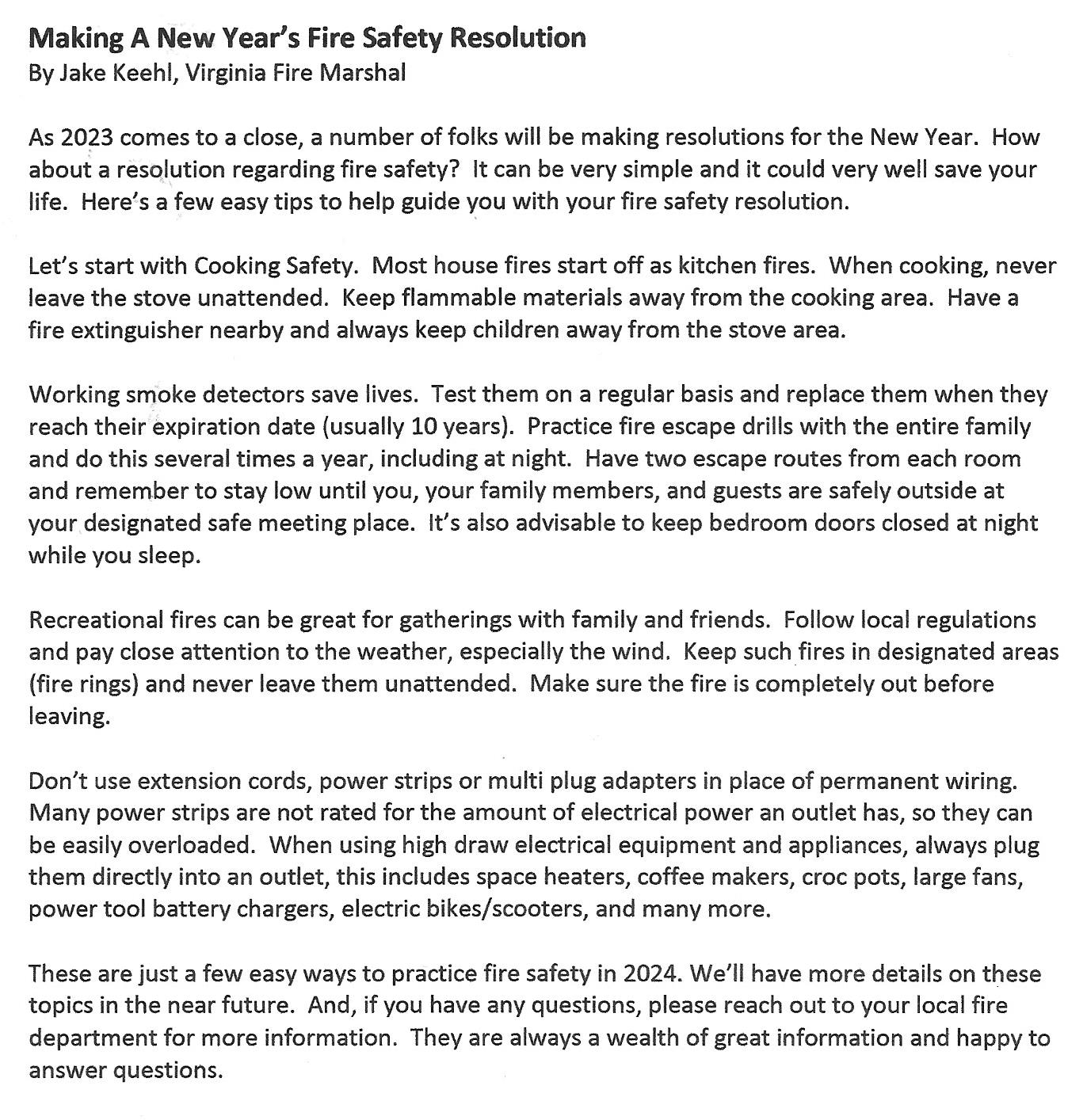
Space Heater Safety
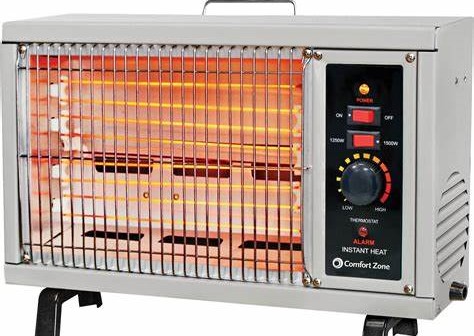
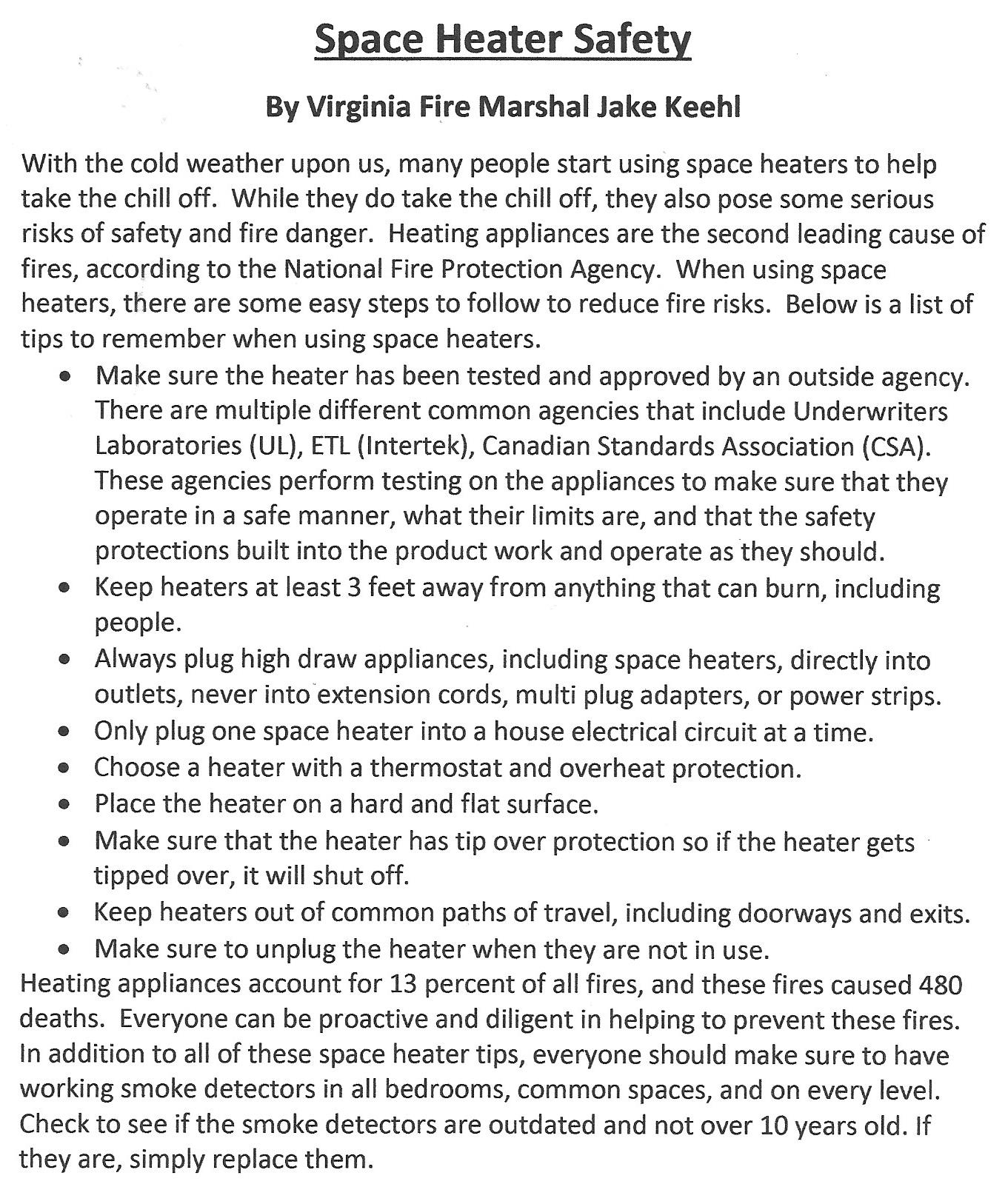
Fill those gas cans with care
The Northland Fire Wire folks have observed a number of people filling up fuel containers in the beds of pickup trucks and on the tailgates. This is a very dangerous activity and could result in an explosion caused by static electricity.
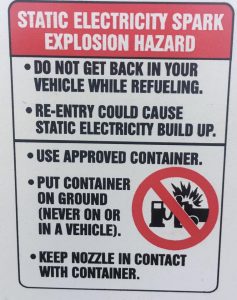
Defining Arson By Hibbing Fire Marshal Bryan Fagerstrom
From time to time, you hear about arson in the news. Most people think of arson when someone burns down his or her home for profit. While this would definitely fall under the category of arson, arson is a much broader crime than many people know.
Arson is broken down into several categories ranging from 1st Degree Arson, where a structure is deliberately damaged or destroyed by fire or explosion(punishable up to 20 years in prison and up to a $20,000fine) to 5th degree arson which is a misdemeanor, punishable by up to 90 days in prison and up to a $1,000 fine. There is also wildfire arson, which is the intentional burning of the land of another, which contains timber, underbrush, GRASS or other vegetation and is punishable up to five years in prison and up to $10,000 in fines.
Springtime also marks the state of the grass fire season. Many of these grass fires are intentionally set and would be considered arson. I want to caution people that above and beyond the legal consequences, there are very serious risks of personal injury and unintended secondary results. Grass fires can spread rapidly from a small contained fire and cause real damage to structures which are in the path of running grass fire. Setting a grass fire is not something to play around with.
Another arson fire we run into, particularly in the summer months, are dumpster fires. Many of these fires are cause juveniles “having fun” late at night. Third degree arson, which is punishable by up to five years in prison and up to $10,000 in fines, is defined as causing damage by fire to property valued over $300 and not more than $1,000. Many of the dumpsters and garbage cans destroyed during these fires fall into this category. Is “having fun” worth being charged with this offense? Also, many of these fires start secondary fires to the adjacent structure. Many of these buildings are in downtown buildings and pose a serious risk to occupants, not to mention the penalty would likely be escalated to first degree arson if the building is occupied.
So, my take on all of this is: please help educate our youth about the seriousness of arson and the damage it can cause. Arson is not something to play around with and carries very steep penalties. I want all our firefighters to go home to their families. Risking lives for an intentionally set fire is just plain unacceptable.
Fire Talk-Wood Stove Safety needs to be year round! By Hibbing Fire Marshal Bryan Fagerstrom
Let’s face it! We live in Minnesota and the weather can change in a moments notice! It can been sunny and warm one day and cloudy and cold the next. With this in mind, we have to make sure that all of our heating appliances are well maintained and operating properly. Many people in our region use wood burning stoves as either a primary or secondary heat source. It is important for those who have wood stoves to follow these simple tips:
1. Follow manufacturer’s recommendations for proper use and maintenance
2. Maintain clearances around stoves, flue pipes, and floors according to manufacturer’s instructions.
3. Inspect all connections on a regular basis.
4. Make sure smoke detectors are installed and working.
By following these simple recommendations, you can make sure that your home or business is Fire Safe.
The “warm and fuzzies” of the laundry-Dryer Safety
Fire Talk with Chris Clark, Interim Fire Marshal, Virginia Fire Department
As we all know, doing laundry is a chore, yet we have to keep fire safety in mind and develop good habits as a dryer can be a source of a fire. Here are some tips to keep your laundry fresh and clean and your family safe.
- Have your dryer installed and serviced by a professional.
- Do not use the dryer without the lint filter.
- Make sure you clean the lint filter before or after each load of laundry and remove any lint build-up around the drum.
- Rigid and flexible metal venting material should be used to maintain the proper air flow and drying time.
- Make sure the exhaust vent pipe is not restricted and the outdoor vent flap opens when the dryer is operating. Keep debris such as snow, shrubs and other materials free and clear of the outside exhaust hood. You should clean your venting system at least twice a year and more frequently if you notice changes in drying times being extended or clothes still being damp. You may be surprised how often you do this and the increased performance of your dryer.
- Keep your dryer in good working order. If you have a gas dryer, have a professional inspect and conduct maintenance on your dryer. You can add this to your list when annual maintenance is performed on your gas furnace. With all gas appliances, remember to have a CO alarm placed in the area.
- Make sure the right plug and outlet are used and the dryer is connected properly.
- Follow the manufacturer’s operating instructions and don’t overload your dryer.
- Turn off your dryer when going to bed or when you are leaving home.
Reference: www.nfpa.org/education
Chris Clark-Interim Fire Marshal-VFD
Fire Talk is back on The Northland Fire Wire
The Fire Talk series is returning to The Northland Fire Wire website. We have recruited the help of Interim Virginia Fire Marshal Chris Clark, Hibbing Fire Marshal Bryan Fagerstrom and the Minnesota State Fire Marshal’s Office to write articles for us. From time to time, we will be adding timely fire prevention information to the website, which may be used by other fire departments in the Arrowhead Region. Our goal is to spread the word about fire prevention!
The most dangerous time of the year!
The holiday season is also the most dangerous time of the year. Heating systems get taxed. Electrical systems get overloaded. Wood burning stoves don’t operate properly. Yes, a wide range of potential fire causes are out there during the holidays and they do strike. In neighboring Superior, Wisconsin; a family used electric heaters to keep warm when their regular home heating system failed. We must always remember that fire never takes a holiday vacation. Don’t become a victim over the holiday season. For that matter, practice fire safety all year long. And, always remember to make sure that your smoke detectors are working properly. This safety message is brought to you by The Northland Fire Wire.
